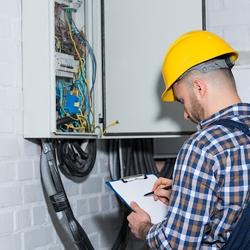Should I Repair Or Replace My Electrical Panel?
Are you stuck between repairing vs. replacing your electrical panel? We can help.
Without having a professional assess your electrical panel, it’s impossible to tell you for sure whether you should repair or replace it. And while you can repair electrical panels, many common issues homeowners face when it comes to their electrical panels require a replacement rather than a repair.
You may be able to repair your panel if:
You may need to replace your panel if:
Below, we’ll go into these situations in more detail, so you can get a better idea of whether repairing or replacing your electrical panel is the best option for you.
Need to replace or repair your electrical panel? Contact Michael & Son
If you’d prefer to have a professional assess your home and current panel and provide you with an expert recommendation, we’d be happy to help.
You may need to repair your panel if:
Your electrical panel has wiring issues
If there are loose or damaged wires coming or going to your electrical panel, it can cause issues that usually require a repair rather than a replacement.
For example, the cables that attach your panel to the structural mount on your home are called service cables. Sometimes, the cable insulation can become damaged, the cables can become loose, or the anchors that hold the service cable in place may be loose.
An electrician will need to evaluate the situation, and if the issue is wiring, a professional can usually resolve the issue without replacing your electrical panel.
You may need to replace your panel if:
Your panel is under 100 AMPS
Many houses built before the 1960s had electrical panels under 100 amps, which is not enough amperage to fulfill most modern homes’ electrical demands safely.
To check the amperage rating of your electrical panel, look for the number on the main breaker inside your panel.
If your home has an electrical panel that supplies less than 100-amp electric service (60-amp panel), you should replace it with one that has at least 200 amps.
Your panel is 25+ years old
On average, electrical panels last between 25-40 years. If your panel is near or past this age, it’s not only likely to break down, but it’s also probably not meeting modern electrical standards and may not be able to support your current appliances.
We understand that 15 years is quite a wide range, and that’s because the lifespan of your electrical panel is dependent on a few different factors like:
- Number of power surges
- General wear and tear
- Any issues or defects
In some cases, an electrical panel in a home may be 25 years old and need to be replaced, whereas someone else may have a 35-year-old panel that’s working effectively. To determine the age of your electrical panel and if it’s in proper working order, we recommend reaching out to a professional.
A word to the wise: While you can continue to utilize an older electrical panel until it does break down, we wouldn't recommend doing so. An old electrical panel runs the risk of breaking down or malfunctioning, which can cause damage to other parts of your home and become a safety issue. Additionally, suppose you wait to replace your electrical panel until you have a problem. In that case, you could be left without electricity for a time, which can negatively impact your home and family.
Your electrical panel is worn out
If you notice that your electrical panel is starting to wear out, it’s time to replace it. You should contact an electrician as soon as possible if you notice signs like:
- A crackling sound coming from the electrical panel
- A circuit breaker that trips often
- Flickering lights when you use other appliances
- An electrical panel that feels warm when you touch it
- A burning odor coming from the electrical panel
- Scorch or burn marks on the panel
- Corrosion or rust on the panel
You’re renovating your home
If you’re planning on adding to or renovating your home, chances are you’ll need to upgrade your electrical panel to support the additional load. Adding any large appliances, like a washer or dryer, or spaces, like an extra room, will require a significant amount of electricity and overload your current panel.
Before renovating, you should meet with a licensed electrician who can determine if your current electrical panel will meet your home’s new demand and, if not, what size panel you need to meet that demand.
Other factors:
There are a few other factors that indicate that you may need to replace your electrical panel, like:
- You have a fuse box—Fuse boxes are typically from older homes, don’t provide a lot of amperage, and are more challenging to reset than circuit breakers. If you have a fuse box, it’s likely time to upgrade your electrical panel.
- You’re out of expansion slots—Your circuit breaker panel should have empty expansion slots that will allow you to add new appliances or anything that requires an electrical circuit. If you run out of expansion slots, it’s time to upgrade your electrical panel.
- Your electrical panel has been damaged—If your electrical panel has been damaged in some way, such as being hit by your car or via water damage, it may need to be replaced. You’ll want to have a licensed electrician take a look and determine what your best next steps are.
Need to replace or repair your electrical panel? Contact Michael & Son
With experienced, licensed electricians and over 3,000+ 5-star reviews, you can trust the team at Michael & Son to provide you with accurate recommendations, upfront estimates and excellent work.
This blog was written on Aug 11, 2021. Any pricing information is subject to change.


